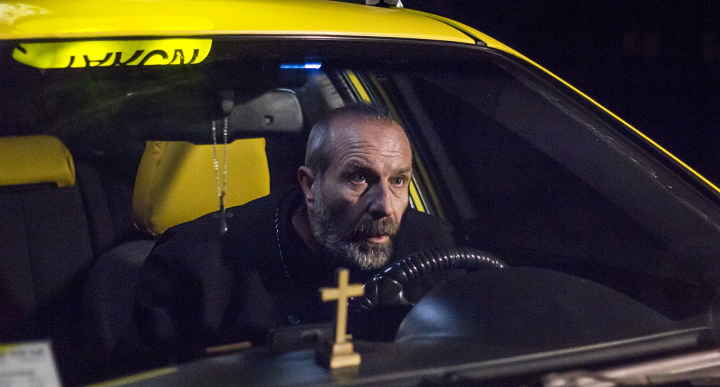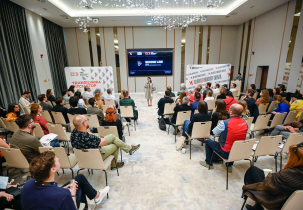
Focus Bulgaria proposes a selection made up of eight titles from the latest generation of Bulgarian auteurs, beginning with Stephan Komandarev’s Directions, selected at Cannes 2017 in the Un Certain Regard section. Echoing Iranian cinema and Jim Jarmusch’s cult film Night on Earth, this film offers an original perspective, imbued with sarcastic humor, on the dysfunctions of contemporary Bulgarian society—using night fares picked up by Sofia taxi drivers as its vehicle. Secrets and intimate details of private lives come to light in Ilian Djevelekov’s Omnipresent, the story of a man obsessively spying his family, friends, and employees on hidden cameras. The film, which received the FIPRESCI Prize at the Sofia film festival and the Golden Rose for Best Film at Varna, demonstrates that small guilty pleasures can lead to disastrous situations.
In Godless, a nurse sells the identities of her elderly patients on the black market. Ralitza Petrova’s debut feature captures the last crumbs of humanity in a devastated, corrupt, and hopeless landscape, and received the Golden Leopard at the 2016 Locarno film festival. The recipient of the same award in the Cineasti del Presente section in 2017, 3/4 is an intimate study on family and on life’s flaws and imperfections. Following the dysfunctional relationship between a father and his two children, the feature debut of Ilian Metev tells the delicately balanced story of one last summer spent in the family.
Rouzie Hassanova’s Radiogram also deals with a father-child connection: set in the 1970s, when Western music was considered a threat by the Eastern Bloc regimes, the story follows the adventures of a parent who wants to share the joys of rock-n-roll with his son. Inspired by the director’s personal memories, the film received an audience award in Sofia this year. Konstantin Bojanov’s Light Thereafter explores love and liberation through art by looking backwards at the initiation voyage of misunderstood young man in love with painting, looking for his idol, and eventually finding himself. The film was awarded for best cinematography at the Golden Rose in Varna in 2017.
Two of the best Bulgarian documentaries of recent years, Tonislav Hristov’s The Good Postman and Trzvetan Dragnev’s Village People, deal with everyday life in contemporary rural communities. The former follows the politics of a border town in which the postman decides to run for office on a platform dealing with migrants and refugees. The latter looks tenderly at the fears, joys, hopes, and obsessions of ordinary people of no readily apparent importance.
Focus Bulgaria is organized in partnership with the Bulgarian Film Centre and the Bulgarian Embassy in Romania.





